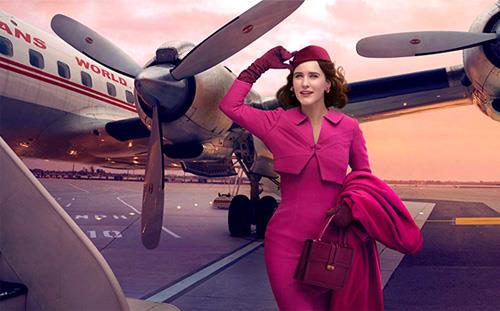
If you've watched the first two seasons of The Marvelous Mrs. Maisel, recommending that you watch the third season is like recommending that if you have a choice of Oreos, you go for the double-stuffed.
There's nothing to think about, really.
Season 3 of The Marvelous Mrs. Maisel launches Friday on Amazon Prime Video. It's still marvelous. So are Rachel Brosnahan as Mrs. M and Alex Borstein as Susie Myerson, Mrs. M's manager.
Mrs. Maisel, the character, is an affluent 1950s New York housewife whose husband Joel (Michael Zegen) leaves her and their two children. In the chaos of the aftermath, she gets custody of the standup comedy career Joel dreamed about and couldn't pull off.
The first two seasons took her through the fledgling stages of a comedy career: empty seats, awkward silence, no money. For a while, it seemed that Midge Maisel's biggest achievement was alienating Sophie Lennon (Jane Lynch), an insecure old-school comedy star who fears, correctly, that Mrs. Maisel's new style of blunt personal comedy could render her obsolete.
Underscoring that blunt personal comedy cred, Midge has become pals with Lenny Bruce (Luke Kirby), whose act regularly incorporates getting arrested for violating the delicate sensibilities of consenting adults.
As Midge becomes ever-more determined to pursue comedy, her parents Abe and Rose Weissman (Tony Shalhoub and Marin Hinkle) go through a roller coaster of reactions, most of them skeptical. In the process, Rose and Abe have become wonderful characters on their own – quirky and totally engaging.
Season 3 picks up on the optimistic note that ended Season 2, with pop/soul crooner Shy Baldwin (Leroy McClain) taking Midge on the road as his opening act.
This gives Midge and Susie their first hint of actual money, though, for the purpose of viewers, that's just an incidental benefit. The real treat is that it takes Midge and Susie out of New York comedy clubs, which have been great themselves, and plunks them down in the other places where 1950s show biz happened.
Okay, the first episode only takes them as far as a New York armory where they're doing a USO show. But that show – filmed in 1950s colors that are simultaneously bright and tantalizingly muted – promises that we're going to love this road trip.
Rich as the visuals may be, of course, they too are the sideshow. The heart of the story lies in the way creator Amy Sherman-Palladino's famously rapid-fire dialogue induces near-constant laughter while quietly building a dozen multidimensional characters, one snappy comeback at a time.
Midge thinks on her feet in microseconds. She's also largely unfiltered. Susie keeps a lot inside and yet somehow tells us as much with silence as Midge does with her confessions.
Perhaps more to the larger point here, they're both restless. They want more, and can only partly define what "more" might be.
It's a trait they share with everyone else in the show, including Midge's parents and Joel's garment industry businessman father Moishe (Kevin Pollak).
The 1950s have gone down in pop culture lore as a docile decade, where Americans relaxed and let the coming good life wash over them. Mrs. Maisel suggests, wisely, that it was more nuanced than that.
To help make that point, Mrs. Maisel is packed with the popular culture of the '50s, from music to retail, amusing us with all of it while mocking none of it.
Midge Maisel, Susie Myerson, and the other characters here, including dozens of fantastic fringe players who hit all the right notes, are figuring out serious stuff in a world that's funny, and not just on stage.
Around the third season of almost every television show ever, someone starts to grumble that it has lost its edge, or it's repeating itself, or the characters are becoming caricatures.
Have that discussion if you want. Or sit back and let a delightful hour of television wash over you. What they said about the '50s wasn't all a lie.